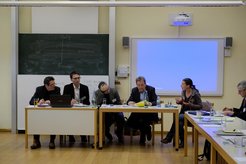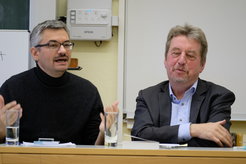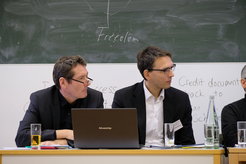Weber in Wittenberg: a Critical Debate on his Concepts
Author: Sylvia Terpe
December 20, 2017
By addressing commonalities and differences in the economic ethics of Eurasian civilisations, the REALEURASIA project engages explicitly with Max Weber’s studies of The Economic Ethics of the World Religions. However, we also emphasize certain shortcomings of Weber, notably his Eurocentric bias, and seek to develop his concepts in new directions.i The REALEURASIA conference on ‘Moral Economies: Work, Values and Economic Ethics’ held in early December 2017 in Wittenberg was a good opportunity to reflect further on the benefits and pitfalls of Weberian social science. The keynote by Hans Joas was followed the next day by contributions from Klaus Kraemer, Frank Adloff and Georg Neugebauer, each of whom took up ideas of Max Weber in a particular way.

In his keynote, Joas presented parts of his new book Die Macht des Heiligen (The Power of the Sacred). Available only in German for the time being, the lecture together with a fresh interview with the author provided an occasion for non-German speakers to become familiar with Hans Joas’ argumentation. As the subtitle of the book indicates, Eine Alternative zur Geschichte von der Entzauberung (An Alternative to the Narrative of Disenchantment), Joas traces the concept of disenchantment through Weber’s writings. He criticizes it in fundamental respects and develops an alternative theory which focuses on the formation of ideals (or moral values) and their connections with processes of power.
Joas’ fine-grained analysis of how Weber used the term disenchantment in his writings led him to conclude that Weber confused four different processes: de-magicification (based on a flawed understanding of what magic is), de-sacralization, de-transcendentalization, and secularization. According to Joas, these processes should be treated separately and they are not uni-directional. In his alternative conception multi-directionality can be investigated with the distinctions sacred–profane, transcendent–immanent, and religious–secular. For instance, processes of sacralization need not have transcendent and religious meanings and might well intensify in an era in which the latter were in decline.
Processes of sacralization are crucial for Hans Joas’ theory of the formation of ideals. Initiated by ‘experiences of self-transcendence’ ii, such processes attach qualities of the sacred to events, ideas, persons or objects. But in order to become ideals, pre-moral experiences have to be articulated as explicit and ethicized positions which one feels urged to defend, i.e. they must be articulated in the form of ‘It is good or bad to do this’. Not all experiences of the sacred reach this stage of ideal formation.
The necessity to differentiate between sacredness and ideals was unintentionally demonstrated in the talk by Klaus Kraemer, who contrasted a strong meaning of sacral beliefs (related to religiosity) with a weak meaning in terms of ‘charismatic ideas’. To illustrate the latter he specified the belief in profitability on the stock market, offering the example of the success of Google as a process of enchantment, but one liable to be followed by a process of disenchantment.iii For Hans Joas, such use of the terms enchantment and disenchantment, neglecting the distinction between the three aforementioned dimensions, confused the significant differences between long-lasting (yet changing) religious ideals and rather short-term commercial fads. He doubted that a belief in future profitability could be considered an ethicized position, i.e. an ideal which people defend and propound in moral terms.
Reacting to Klaus Kraemer, Frank Adloff suggested differentiating between processes of sacralization (in the sense of Hans Joas) and processes in which objects, places or persons are simply infused with ‘emotional energy’ and thereby become valuable in the rather mundane sense that people want to possess them (e.g. consumer goods). Thereby Adloff referred to Randall Collins’ theory of interaction ritual chains, according to which sacred objects are the outcome of specific kinds of interactions (rituals in a broad sense) and symbolize social relationships.iv
Adloff’s interesting suggestion deserves further consideration, but it also raises new questions. How do experiences of self-transcendence in processes of sacralization as described by Hans Joas differ from Collins’ interaction rituals? Does not any successful interaction ritual entail a moment in which the self transcends itself? Does Collins describe just one (collective) way in which experiences of self-transcendence may emerge, whereas the approach of Joas is broader because it allows for other (individual) ways to make such experiences? Nevertheless the perspective of Collins might be useful in shedding light on the differences between interaction rituals in various social contexts. For instance, which ingredients of an interaction ritual change when one moves from a religious to an economic context? Building on Joas, one might ask further whether it is useful to distinguish multiple experiences of self-transcendence and their attendant social contexts.
But the suggestion of Adloff might also lead in another direction. While experiences of self-transcendence might differ depending on social context, the context might provide different vocabularies and thereby different forms of articulation – not all of them prone to mature into an ethicized position, i.e. into an ideal or value in the sense of Hans Joas. Such a perspective invites the social scientists to distinguish between ethicized or moral articulations on the one hand and non-moral articulations on the other hand.
The presentations by Georg Neugebauer and Frank Adloff touched on a further criticism formulated by Hans Joas. This particular criticism is directed not so much at Weber as at those of his successors who attribute to him a theory of functional differentiation. On the one hand, Hans Joas shows convincingly that the text commonly cited as the source for such an interpretation, Weber’s Zwischenbetrachtung (Intermediate Reflection) of 1920, does not allow such a reading. On the other hand, he criticizes the use of the term Entzauberung in the sense of a metanarrative which captures the logic of a long-term development, that of an ever growing differentiation between ‘spheres of life’.


If one takes this criticism seriously, one also has to question such taken-for-granted conceptualizations as economy, politics, science and family. But what would take the place of such terms? What alternative vocabulary and concepts do the social sciences offer? The contribution by Georg Neugebauer shed some light on the price to be paid if they are dismissed. He argued that Weber, in his late economic sociology, constructed economic action as an ideal-type related solely to instrumental-rational action and completely free of value-rational elements. While Neugebauer emphasized that deviant empirical cases could be illuminated by an ideal-type, such a construction might have a further benefit. Only if one constructs a pure type of instrumental-rational economic action does it become clear how exactly particular non-instrumental conditions are preconditions for such a type of action. From this perspective, persistent economic actions have to be embedded in political and legal institutions, justified by ethical positions and motivated by moral motives and attitudes.v
But what if such a construction totally misses the logic of empirical forms of (economic) action? In his presentation, Frank Adloff argued that Weber’s terminology of separate types of motives is inadequate empirically: it tears apart what belongs together. As an alternative, Frank Adloff presented the outlines of his pragmatist approach of the gift and giving.vi These phenomena cannot be reduced to either utilitarian or normative orientations. Instead one has to understand gifting as a complex mixture of situationally and relationally embedded practices. Against this background, Adloff suggested conceptualizing economy not as a self-regulating system in which instrumental rationality prevails, but as a hybrid and entangled phenomenon which is constituted by economic practices such as householding, reciprocity, redistribution and markets.
This thought-provoking argumentation, building on the works of Mauss and the substantivist economic anthropology of Karl Polanyi, raises at least three complexes of interrelated questions. First, what is the common denominator of all these practices that renders them ‘economic’? Don’t they rely on an underlying understanding of ‘economy’? But don’t we have to give up such an understanding if we take Joas’ criticism of the idea of functional differentiation seriously? Second, is Frank Adloff’s approach to the gift to be understood as an alternative conception that is irreconcilable with Weber’s ideas? Or might practices of giving constitute an additional ideal-type, or ideal-types, alongside the types of instrumental action and action based on value commitment? Third, what if the instrumentalist language of homo economicus left the spheres of science and economy long ago (the notion of sphere is problematic but it seems difficult to dispense with it altogether) to be adopted by laypersons to articulate and make sense of their experiences? Aren’t there plenty of situations in which people express their experiences in terms of conflict between rational interests and value commitments? Hans Joas’ distinction between a discursive level of world-views and a pre-reflective level of values, together with his notion of articulation, may help us to conceptualize and understand such situations. In any case they remind us not to be too hasty in dismissing all of Weber’s ideas, since at least some of his distinctions seem highly relevant to grasping what is going on empirically.
References
i Terpe, Sylvia 2016. Max Weber’s ‚Spheres of Life‘: a Tool for Micro-Sociological Analysis. Max Planck Institute for Social Anthropology Working Papers, Working Paper No. 179.
ii See for this concept also Joas, Hans 2000. The Genesis of Values. Chicago: University of Chicago Press.
iii Kraemer, Klaus 2016. Propheten der Finanzmärkte. Zur Rolle charismatischer Ideen im Börsengeschehen. In: Schwinn, Thomas & Albert, Gert (eds.), Alte Begriffe – neue Probleme: Max Webers Soziologie im Lichte neuer Problemstellungen. Tübingen: Mohr Siebeck.
iv Collins, Randall 2004. Interaction Ritual Chains. Princeton: Princeton University Press.
v Kraemer, Klaus 2016. Sociology and Capitalism Research. Economic Sociology – The European Electronic Newsletter 18 (1): 18-28.
vi Adloff, Frank 2016. Gifts of Cooperation, Mauss and Pragmatism. London: Routledge.


